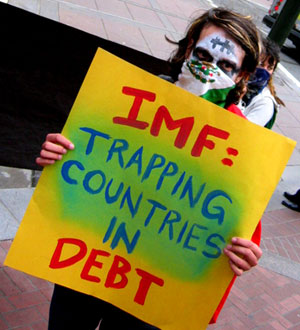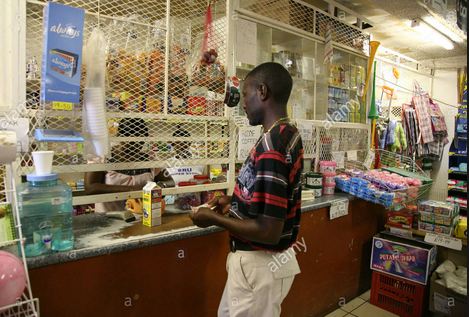In Weekend Nation newspaper, popular columnist Ephraim Munthali of the ‘Cut the chaff‘continues to critique the economic performance of President Joyce Banda. Here if the full articled as it appeared:
So, the International Monetary Fund (IMF) came to Malawi, peeped into our little bundle of forex at the saw an uptick in our import cover there (albeit a statistically insignificant one) and then, lo and behold, declared as “commendable” government’s implementation of the economic programme—the Extended Credit Facility (ECF)—it supports.
In case you missed it, the IMF executive board last week completed its second review under the ECF arrangement for Malawi by largely looking at quantitative targets—probably on spread sheets Governor Charles Chuka had prepared in anticipation of the review—and policy implementation over the previous three months as well as economic projections.
For sticking to the agreed programme, the Joyce Banda administration was rewarded with some bragging rights worth $19.6 million (K7.8 billion), bringing total disbursements under the current programme to $58.7 million (K23.5 billion).
The total package to help government implement the ECF is $156.2 million (K62.5 billion) that the fund’s board approved on July 23 2012 to cover a period of three years.Just to put things into perspective, the good performance that government is being paid to carry out include weakening the kwacha by roughly 140 percent from K167 in May 2012 to K400 today; almost doubling fuel prices from around K360 to over K700 as well as making water and electricity more expensive now than ever before.
These are among many other reform measures centred on free market principles that the Joyce Banda administration is being rewarded for, but which have worsened poverty in the country by eroding purchasing power as the cost of living races miles ahead of people’s real incomes, a direct result of the policies’ hasty and reckless implementation over the past 12 months, with IMF as the bemused referee.
It is also interesting how the IMF has measured the success of the current programme. If you read the statement that David Lipton, first deputy managing director and acting chairperson, issued after the review, you can’t help but conclude that the whole programme is all about exchange rate policy.
“Malawi’s performance under the fund-supported programme has been commendable despite a difficult environment. The policy reforms have begun to yield positive results, including increased availability of foreign exchange. The government also successfully rolled out its social protection programmes.”
Clearly, the social protection bit is an afterthought; otherwise, why has the fund not told us about the impact the programme of cushioning the poor from the harsh reforms is having after triumphantly singing about forex availability in the same paragraph?
It is simple, really.
Availability of forex is the most important yardstick to these folks because big conglomerates can now import raw materials and goods to make a killing; because banks can now happily trade in forex and make outrageous profits out of struggling Malawians and, of course, because that justifies the fund’s tired and long discredited notion that free markets—after they have made the rich, richer and the poor, poorer and worsened inequalities—can finally throw some crumbs, assuming there can be any left from the greedy capitalistic wolves, to “trickle” down to the poor.
No wonder the fund’s policies never work for the poor! I know that the IMF is too quantitative, but this time, even the quantitative data they have based their conclusions on—never mind that they never care about qualitative data—is an embarrassment, to say the least.
I mean, should we determine the success of an economic programme by one quantitative factor that has allowed a few units in an economy such as banks make windfall profits while choking the majority?
What happened to growth, productivity, equity and, yes, living standards as measures of economic success? If a whole macroeconomic programme hinges on one aspect of the economy—forex availability—then it ceases to be a programme. It becomes a project.
Again, why is it that the fund has just glossed over on the areas that government has failed most as read in the following passage of its statement?
“Continued tight monetary policy and fiscal restraint are needed to contain aggregate demand, stabilise the exchange rate and prices, and boost international reserves. The RBM is committed to maintaining a tight monetary stance until inflation pressures recede. The fiscal authorities are also committed to implementing prudent policies in the run-up to the 2014 general elections. In particular, the FY2013/14 budget will include measures to offset the impact of recent wage increases on the budget.
“The authorities are also pursuing reforms to broaden the tax base, improve revenue administration, and exercise greater control over expenditures. It will be important to safeguard the stability of the financial system. The RBM is strengthening its oversight of banks and is assessing the true financial condition of all banks with a view to enforcing prudential regulations. It has also enhanced its monitoring of banks that have continued to have difficulty meeting liquidity requirements.”
My God, can you see how this quoted passage has been sugar-coated to bury the spectacular failure in containing inflation, reigning spending, spurring growth and instilling confidence in the financial system (except for a few, most banks are trembling like leaves on a windy day!)? Have you seen how this package of failures has been turned into a to-do list for the Banda administration? Whew!




